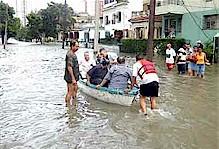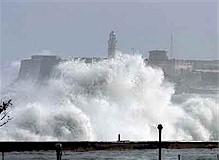 Heavy flooding in the capital damaged more than 2,000 homes, offices
Heavy flooding in the capital damaged more than 2,000 homes, officesand other buildings and polluted potable water tanks with sea water.
(PL)
From Worker's World
By Deirdre Griswold
Published Oct 26, 2005 10:04 PM
Once again, the great contrast in how authorities responded to a natural disaster has illuminated the social and class differences between the United States and Cuba.
Hurricane Wilma hit Cuba twice. First, as it moved northwest through the Caribbean, it dumped an unprecedented amount of rain on Cuba’s western provinces. Then, after it hit Cancun in Mexico and swung toward Florida, it slammed the island’s north shore with more rain and high winds that drove huge waves into the capital city of Havana.
The recorded annual rainfall in Pinar del Rio, a fairly dry western province, has never gone above 57 inches before. With Wilma and earlier storms, the province’s total rainfall for this year is already at 70 inches.
Huge waves kicked up by Wilma breached Havana’s seawall and flooded the city up to four blocks from the waterfront. Residents said the flooding, which in places was three feet deep and inundated basement apartments, was even worse than the 1993 hurricane that was dubbed “the storm of the century.” The salt Wilma’s waves left behind is expected to cause more damage to Havana’s buildings.
Despite all this, not one Cuban life was lost to the storm.
For the first time, the Associated Press put out an unbiased article on the effectiveness of Cuba’s emergency preparedness system, which has been recognized by the United Nations and many other countries as probably the best in the world.
Entitled “Wilma Floods Havana but Kills None,” the AP report from the Cuban capital appeared on Oct. 26 in the New York Times and several other U.S. newspapers.
Why no Cubans died
“Part of the country’s good fortune,” says the article, “could be because Wilma never made landfall here, but many also credit the fact people in Fidel Castro’s Cuba are instructed from an early age how to move quickly during a natural disaster.
“The United Nations and other international organizations have long praised Cuba’s track record in preserving lives during hurricanes that regularly batter the island. When a tropical storm starts brewing in the Caribbean, a well-oiled hurricane-response machine clicks on in Cuba.”
The article describes how everyone on the island is kept informed when a storm nears. “Jose Rubiera, head of Cuba’s National Meteorology Institute, starts making television appearances, contributing to his near-celebrity status on the island. If asked on the street, most Cubans can recite the storm’s latest coordinates and projected route.”
If the storm looks like it is going to hit Cuba, the whole country mobilizes for the evacuation phase.
“In the days before Wilma passed Cuba, about 700,000 people were evacuated in this country of about 11.2 million.
“All the state’s resources are mobilized, focused on the same goal: to ensure that no one dies.
“Vehicles are rounded up to provide transport for people in danger areas, and schools and other government buildings are converted into temporary shelters.
“Citizens serving on civil defense committees—organized by community, by neighborhood, even by block—also go into high gear, ensuring that each shelter is properly stocked with food, water, blankets and other supplies. ...
“By the time the storm hits, the streets are empty, with residents tucked away in locations believed to be safe from whipping winds and drenching rains.”
Most of those evacuated—80 percent, according to officials—were taken into their homes by other Cubans.
The AP account continued: “‘Everyone helps each other here,’ Dayami Gonzalez said Tuesday while cleaning up her Havana home after floodwaters that had reached more than 3 feet inside began receding. ‘In the United States it seems like there’s more egoism, where everyone just worries about themselves.’
“Giraldo Garcia, 64 and retired, blamed the U.S. government for the more than 1,000 Katrina-related deaths in New Orleans and the rest of the Gulf Coast.
“‘It’s like those in power don’t think about anything but war,’ Garcia said. ‘It was so painful to see innocent people whose lives could have been saved.’ Garcia praised his own country’s system. ... ‘If there’s any risk to human lives, I know that the government won’t leave us to lady luck.’”
Not mentioned in this article is that the Cubans also don’t have to worry about what will happen to their jobs, or how they will get health care if needed. In socialist Cuba, economic security, education and health are guaranteed rights of all the people.
It seems to have taken the terrible disaster on the Gulf Coast—where racism, poverty and the protect-property-first attitude of the authorities led to such horrific levels of death and suffering-to force such a truthful article about Cuba into the U.S. press.
Florida: curfews, no water
News about what is happening in Florida since Wilma struck that very rich state is just now starting to come out. At least six people are dead. Three million are still without power, “including about 93 percent of customers in Broward and Miami-Dade counties.” (New York Times, Oct. 26) Miami-Dade County is predominantly Latin@ and Black.
People are lined up in their cars for blocks expecting government deliveries of water and ice that don’t come. They are being told to boil their tap water, but have no electricity to do so.
Dawn-to-dusk curfews are in place throughout the region. Who will be stopped by the police? Wealthy whites, or poor African Americans and Haitians?
By contrast, across the state in Naples, “one of the wealthiest cities in the country” near where the hurricane first made landfall, “ice and water distribution appeared to be going more smoothly.” By Tuesday, Oct. 25, most of the streets there had already been cleared of fallen trees and debris.
The hurricane also killed people in Mexico, Haiti and Jamaica, where it did great damage. Most media coverage, however, has focused on the problems faced by tourists in Cancun.
This article is copyright under a Creative Commons License.
Workers World, 55 W. 17 St., NY, NY 10011
Email: ww@workers.org
Subscribe wwnews-subscribe@workersworld.net
Support independent news http://www.workers.org/orders/donate.php

Comments